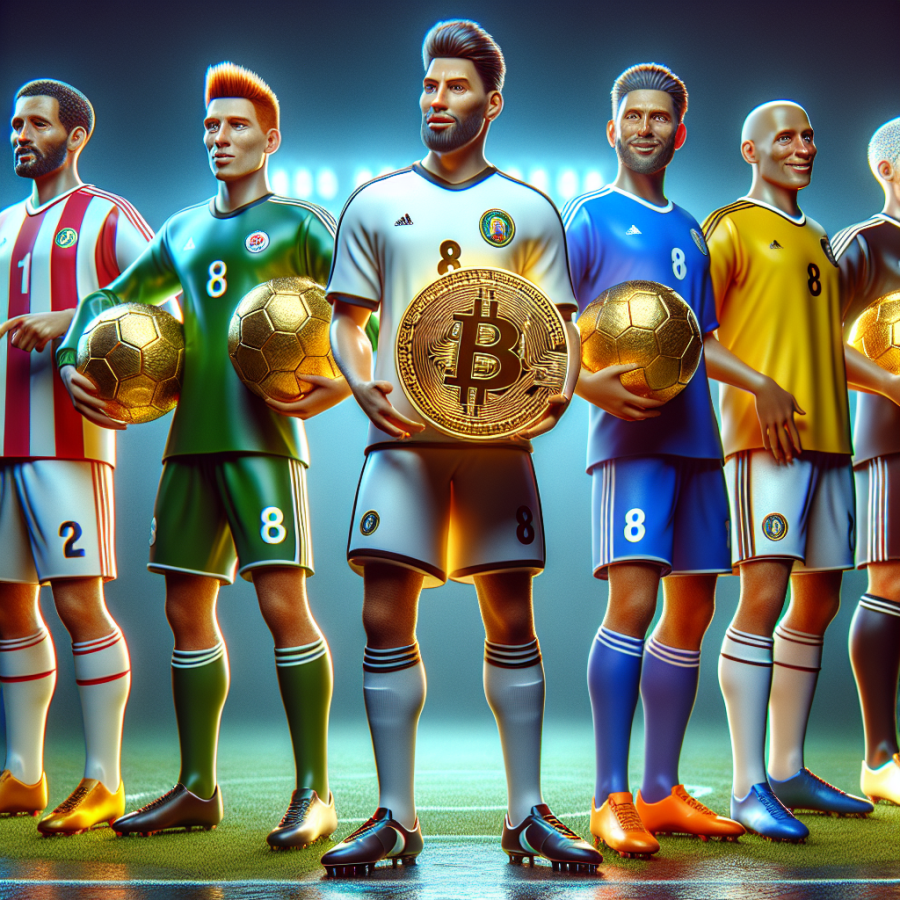Striking Rich Online: How Top Footballers Are Scoring with Cryptocurrency Rewards
With the meteoric rise of digital currencies, a new avenue for rewarding athletic prowess has emerged, and football stars around the globe are quickly embracing this trend. Five of the most accomplished names in the sport are not just earning their goals on the pitch but are also amassing significant earnings through cryptocurrency.
At the apex of this movement is Lionel Messi. Apart from his salary and endorsements, the Argentinian superstar has struck a deal that incorporates crypto payments into his financial portfolio. Notably, his move to Paris Saint-Germain included a payment in PSG tokens, showcasing the integration of cryptocurrency into conventional sports contracts.
Adapting to similar trends, Neymar Jr., the Brazilian icon, has followed suit. With a fan base stretching across continents, Neymar's influence on and off the field has drawn blockchain firms eager to partner with him. His earnings in cryptocurrency come with the potential for growth, much like his dynamic playstyle.
Andrés Iniesta, the Spanish maestro known for his impeccable vision on the field, is venturing into digital investments. By lending his image to Binance, a prominent cryptocurrency exchange platform, Iniesta curates a unique blend of traditional football excellence and modern financial strategy.
Next on the list is James Rodriguez, the Colombian footballer who became the first to launch his own cryptocurrency named JR10 Token, in partnership with SelfSell. The initiative gave fans a chance to invest in Rodriguez's brand and potentially reap rewards parallel to the midfielder's career progression and success.
Last but not least, the Welsh wizard Gareth Bale has expressed interest in digital currency options, potentially considering ways to incorporate cryptocurrency rewards into his income streams. As an athlete who consistently breaks barriers, Bale's exploration of the crypto space indicates its growing acceptance as a legitimate form of value within the sports industry.
These top footballers, by diversifying their income through cryptocurrency, not only heighten their own financial security but also pave the way for future athletes to view crypto earnings as a standard component of their career earnings. As the digital economy expands, the convergence of sports, entertainment, and finance continues to evolve, positioning cryptocurrencies as an essential goal that modern athletes are eager to score.
Read also:
Mastering the Game: Strategies for Quiz Bowl Success
Pioneering Players: Soccer Stars Embracing Bitcoin as Payment
In the realm of professional sports, soccer has always stood out as a global phenomenon, capturing the hearts of billions and establishing its players as some of the most recognized figures worldwide. With the advent of digital currency, a new trend is on the rise, with a vanguard of soccer stars beginning to accept Bitcoin as part of their payment. This not only reflects their personal investment strategies and belief in the future of finance but also illustrates a broader acceptance of cryptocurrency within the sporting sector.
Leading the charge is the renowned former Real Madrid striker, David Barral, who made headlines as the first professional player to be purchased using Bitcoin by the Spanish third division club, DUX Internacional de Madrid. Barral's groundbreaking move has set a precedent and marks a revolutionary moment in the intersection of finance and sports.
Following Barral's footsteps is the Argentine soccer maestro, Lionel Messi. His move to Paris Saint-Germain included a payment structure that incorporated cryptocurrency. The deal purportedly included a significant amount of PSG's fan token, which showcases Messi's willingness to engage with modern forms of investment and stake a claim in the burgeoning crypto-space.
Another player who has shown interest in the new currency trend is Danish former Tottenham midfielder, Christian Eriksen. While his payment in Bitcoin hasn't been officially confirmed, there has been substantial speculation that Eriksen might engage in contractual agreements that include cryptocurrency, signaling a growing acceptance among high-profile players.
Andre Onana, the Cameroonian goalkeeper, is another player among the early adopters of cryptocurrency as compensation. Although not yet mainstream, such cases highlight the increasing curiosity and confidence that these athletes have regarding digital currencies.
Keisuke Honda, the Japanese football veteran, launched his own cryptocurrency, KSK Honda Coin, in partnership with Rally.io, a social token platform. Honda's coin is designed to create a new fan economy, giving holders exclusive content, Q&A, and private messages with Honda himself.
These pioneering players represent just the beginning of what could be a significant shift in how athletes are compensated, signaling a paradigm shift in the financial management of sports personas. As digital currencies continue to grow in popularity and stability, we can expect to see more soccer stars—and indeed athletes from a range of sports—leveraging cryptocurrency as a viable payment option.




